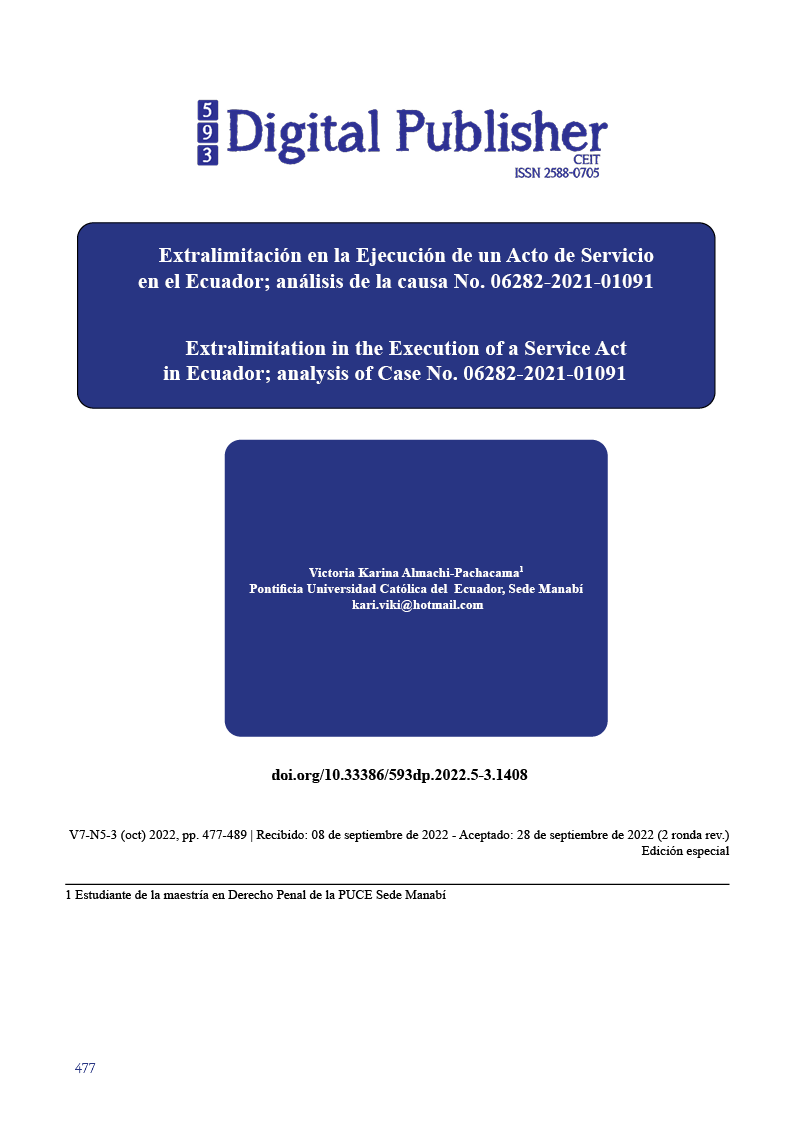Extralimitation in the Execution of a Service Act in Ecuador; analysis of case No. 06282-2021-01091.
Main Article Content
Abstract
The present research work analyzed whether or not there was a correct application of the Ecuadorian Legislation in accordance with Articles 46 Transcendental attenuating circumstance and 293 Extralimitation in the execution of an act of service within the case No. 06282-2021-01091, and also considered what were the substantial grounds considered by the Court of Criminal Guarantees of Riobamba when issuing its sentence.
As this is a qualitative, descriptive study, it is intended to provide a broader perspective on the use of firearms and other types of force used by the police officer Santiago Olmedo against the criminals on June 11, 2021; and through a documentary review of the sentence of case No. 06282-2021-01091, it is also considered what were the substantive grounds considered by the Court of Criminal Guarantees of Riobamba when issuing its sentence. 06282-2021-01091, it will be concluded with the observation of the correct application and severity of the norm, from the approach of the actions of the police officer in a criminal act, and the high degrees of violence that they are forced to handle by the criminals.
It is concluded that there is an inaccuracy and lack of judgment, since the police officer made an inadequate use of force and exceeded the margins established by law and the regulation of the Legal, Adequate and Proportional Use of Force for the National Police of Ecuador, since there should be a fair treatment and rigidity of judgment for police officers.
Downloads
Article Details

This work is licensed under a Creative Commons Attribution-NonCommercial-ShareAlike 4.0 International License.
1. Derechos de autor
Las obras que se publican en 593 Digital Publisher CEIT están sujetas a los siguientes términos:
1.1. 593 Digital Publisher CEIT, conserva los derechos patrimoniales (copyright) de las obras publicadas, favorece y permite la reutilización de las mismas bajo la licencia Licencia Creative Commons 4.0 de Reconocimiento-NoComercial-CompartirIgual 4.0, por lo cual se pueden copiar, usar, difundir, transmitir y exponer públicamente, siempre que:
1.1.a. Se cite la autoría y fuente original de su publicación (revista, editorial, URL).
1.1.b. No se usen para fines comerciales u onerosos.
1.1.c. Se mencione la existencia y especificaciones de esta licencia de uso.
References
Diccionario Real Academia Española. (2019). Uso de la fuerza.
Disponible en: https://dej.rae.es/lema/uso-de-la-fuerza
Comisión Interamericana de Derechos Humanos, (2015) Desarrollo de los derechos humanos en la región Informe Anual. Capítulo IV. Pág. 468.
Disponible en: http://www.oas.org/es/cidh/docs/anual/2015/doc-es/InformeAnual2015-cap4A-Introduccion-ES.pdf.
Ferrrajoli, L. (2006). Razones para el pacifismo. ProQuest EbookCentral.
Jiménez, B. (2000). Investigación cualitativa y psicología social crítica. Contra la lógica binaria y la ilusión de la pureza. Investigación cualitativa en Salud.
Disponible en:
http://www.scielo.org.pe/scielo.php?pid=S172948272007000100009&script=sci_arttext&tlng=e.
La Hora, (2021, septiembre 27). Entrevista a Santiago Olmedo, policía investigado por evitar un robo en el que fallecieron dos persona
Disponible en: https://www.lahora.com.ec/imbabura-carchi/policia-evita-robo-juzgado-santiago-olmedo.
Específicos.
Código Orgánico de las Entidades de Seguridad Ciudadana y Orden Público. (21 de junio de 2017).
Disponible en:
https://www.cienciasforenses.gob.ec/wp-content/uploads/2018/01/COESCOP.pdf.
Código Orgánico Integral Penal. Quito, Pichincha, Ecuador. (03 de febrero de 2014).
Ley Orgánica de Garantías Jurisdiccionales y Control Constitucional. Quito. (13 de diciembre de 2020).
Muñoz G-. P. (2020). Análisis del uso de la fuerza en la legislación ecuatoriana, sus causas y efectos judiciales. Guayaquil, Ecuador.
Disponible en:
http://repositorio.ucsg.edu.ec/bitstream/3317/14655/1/T-UCSG-PRE-JUR-DER MD284.pdf.
Acuerdo Ministerial No. 4472. (2011, enero 17). Reglamento de Uso Legal Adecuado y Proporcional de la Fuerza para la Policía Nacional del Ecuador.
Acuerdo Ministerial No. 1070. (1998, septiembre28). Reglamento de Disciplina de la Policía Nacional,



